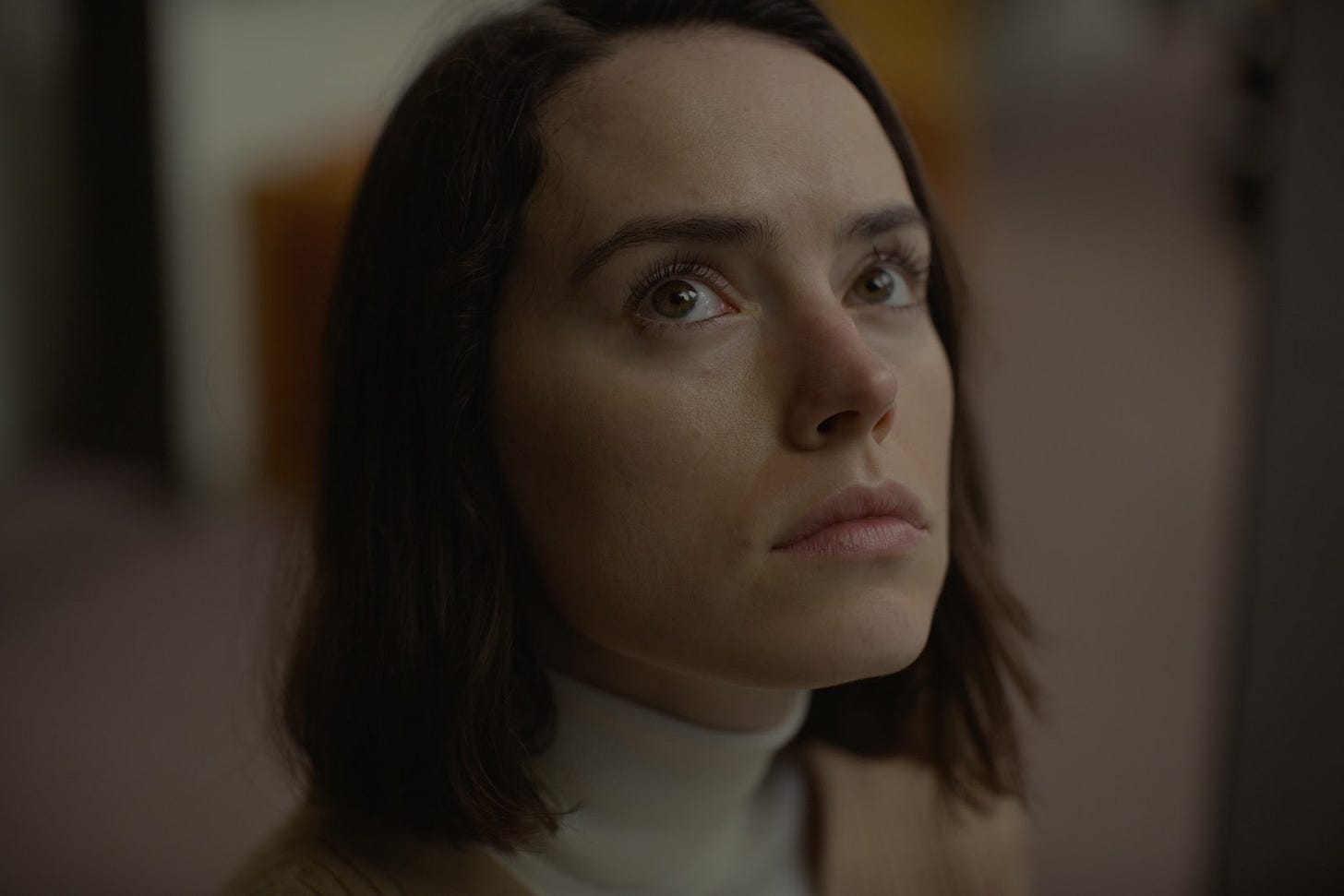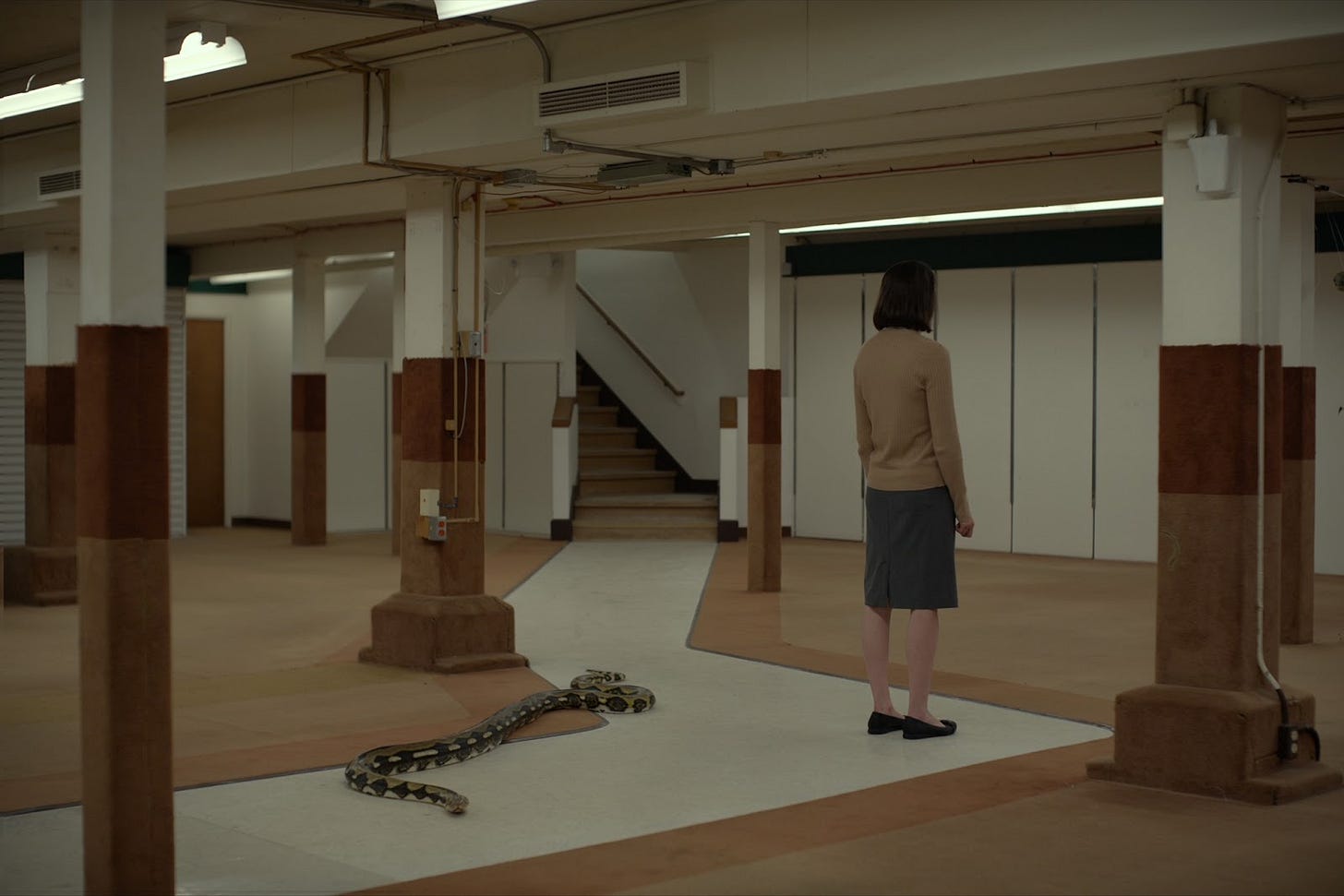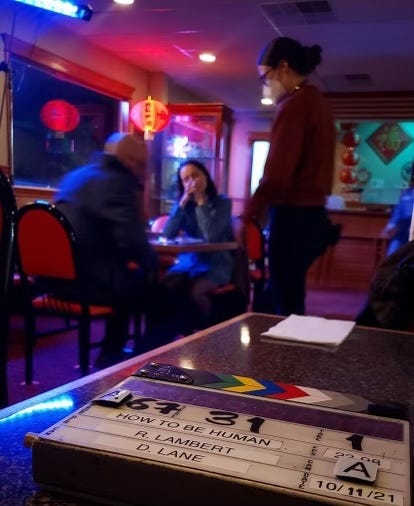Rachel Lambert On the Debt Directors Owe to Their Teams
The 'Sometimes I Think About Dying' filmmaker discusses the craft and role of directing with Grant Conversano.
Hello! Welcome to Nothing Bogus, an Indie Film Listings+ newsletter. The + is commentary, interviews, dispatches, tutorials, and other groovy stuff. This week, filmmaker Grant Conversano is filling in. They interviewed Rachel Lambert, whose new film Sometimes I Think About Dying, was just released. You’ll find the listings at the bottom of this email.
by Grant Conversano
I first crossed paths with filmmaker Rachel Lambert when she was putting together her first feature film, In the Radiant City, in 2016. I was in film school at UNC School of the Arts at the time, and her production was slated to shoot in Tennessee. They were looking for local crew, and I was sent the lookbook. I did not end up working on the film, but I kept the lookbook on my hard drive and remember referencing it often for inspiration. This was clearly a filmmaker with a point of view and sensibility that I felt akin to and wanted to know. When In The Radiant City made its way through the festival circuit, Rachel and I met, and we’ve been friends since. In this interview, we talk about her journey as a filmmaker, her new film Sometimes I Think About Dying, and how she views the role of a director.
Conversano: In the Radiant City was your narrative feature debut and it went on to premiere at TIFF in 2016. Your most recent film, Sometimes I Think About Dying, premiered in competition at Sundance in 2023, and your upcoming feature screenplay Carousel was just featured on the Black List, which is very exciting. Do you see a through line between these projects in terms of characters, story, or even visual sensibility and what you're trying to say as a filmmaker? Or do these all feel like totally separate chapters of your life?
Lambert: They all definitely deal with loneliness, because I think loneliness is a big theme for me. And I think they all deal with time. Our relationship to it, its influence on us, our psyche, our perspective, and our relationship to it can be as emotional as a relationship to a human being. So I'm very intrigued by that dynamic, and it shows up in everything I do at some level. Even with Sometimes I Think About Dying. I didn't write that, but ultimately that became the way that I interpreted the piece. That became the lens through which we made decisions about grammar and through which me and Daisy [Ridley] made decisions about the character of Fran.
Carousel is probably the most overt film about time. In the Radiant City is also about time. It's about a person who basically removed himself from time and now has to deal with the consequences of thinking somehow that he could dominate time and eradicate the past. And you can't. As Nina Simone says, time is a dictator.
Conversano: I read that Daisy saw In The Radiant City, and that was initially how this conversation for Sometimes I Think About Dying ended up happening?
Lambert: I think great actors in cinema love cinema and they watch it and they care about it. Daisy certainly cares. She loves cinema. She loves art. And she has such an omnivorous appetite for it. She's so down to watch new voices and new people. She watched In the Radiant City and included me on a list of filmmakers that she would like to work with.
Sometimes a producer attaches an actor to a project and they’ll say, “We have our list of ideas to direct this, do you?” And often by being on that list, you get sent the script. That doesn't mean that you have any chance of getting the job, but it means that you get to see what this actor is attaching to. In this case, I got sent a lot of them and I learned about her taste. I learned about her humor. I learned about the kinds of characters she was drawn to. The depth of writing she's attracted to is a wonderful way to get to know her in a way. So then when I read Sometimes I Think About Dying, the very first conversation I had with Alex Saks, my producer, and the most important person in my creative life, was about who Fran would be. And the first name I said was Daisy Ridley. So a lot of the development of decisions for a director is in these very unsexy, quiet, private years and years of work.
Conversano: Most people who are reading this are probably young filmmakers who are trying to make their first feature. And I think there's, you know, a lot to read out there about getting started, but there's less about what happens when the doors open to a degree and you're trying to make a second, third, or fourth film and build a career.
Lambert: That's much harder. I certainly didn't know just how much harder it would be to make the next film. And why would I? When you make your first narrative feature, and if you get the good fortune that we had of premiering at TIFF or a festival like that, there is a sense that maybe it won't be quite as hard [next time]. Not that it will be easy, but maybe those pieces will come together without quite so much bloodletting. I really hadn't yet figured out who I was, what I believed. I hadn’t quite built a filtration system or an immunity system where I could filter and understand the business side of industry. I couldn't make sense of all that. So I believed everything, and therefore didn't protect my own brain and my own decision making center well enough.
After I made In the Radiant City, I was living in Los Angeles, and it was very hard. The antidote to that was listening once again to the people close to me. So I went back to Nashville and made [work] and listened to myself and to my closest confidants, the artists that I value and the artists that I trust, the producers I trust. The film that came out of that, I Can Feel You Walking, really was a kind of return to that sanity, to that truth. And making something out of that reset me a little bit. So while the process of making films hasn't gotten any easier, the path by which I navigate and make decisions has gotten much more clear. I think the things we've achieved since I Can Feel You Walking have been consistently strong. I felt strong. My team is strong, the path is more clear.
Conversano: You starred in I Can Feel You Walking. What did you learn from that experience and how did it affect how you directed Sometimes I Think About Dying?
Lambert: I think if you're going to direct, you need to study with actors. If there is a piece of advice I can offer that's really firm and simple it’s: Take an acting class. Take it seriously. Don't see it as just I have to eat my broccoli. Really care, really give a shit as much as everyone else around you and see what that does to you. You know, I trained as an actor. That's what I got my college degree in. But it doesn't mean I now speak some sort of secret language that only actors know. What it means is I know how to shut up and respect what they're doing and watch what they're doing and pay attention to what they're doing. And my job is to coax it, to preserve it, and to capture it and to protect it. That's my job. It's not to tell them what to do. Anyone who thinks that's how to direct an actor is out of their mind. You need to be prepared as a director to form and to support that performance. But it's certainly not like ‘Let me tell you who this person is and how to read that line and what your emotion is here.’ That's their job.
Conversano: How did you and Daisy find the voice that she created for Fran?
Lambert: That's all her. That's her. Anything that I offer that goes into those choices, I'm sure it's all the sort of surrounding stuff, like conversations about songs we're listening to, questions we're having about her person, her history, images, animal work. She then is synthesizing and following gut instinct and listening and making choices because she's the department head of her character. I hire artists to be artists. I feed them the script, or my interpretations of that script. We talk deeply about what it's saying, how it's saying it, and what's important. Themes, motif, symbols, images, emotion, sounds, music. We talk about all these things, but then I don't prescribe to them how to be an artist in their department. They've dedicated their lives to figure out their artform. So, you know, for me, I feed and I feed and I feed the artist until they are full enough to come back to me with their choices. And then they can have a dialogue about that. Does that feel right? I can maybe nudge or sculpt or shape, but I can't make decisions as the director until that artist is like, Here's some choices, here's some ideas. Then I get to have a response. Otherwise, it's just me monologuing, and who gives a shit about that?
Conversano: Could you tell me about casting Dave Merheje as Robert?
Lambert: Dave is unreal. I like working with comedians. I’ve worked with comedians in nearly everything now. I like the way they think. I like that there's a sort of inborn permission to slip up and try. I like the quickness of their brains. So that was something I wanted. But also, I thought the film was funny. I don't know if every person interpreted the script that way but I thought it was hilarious.
Conversano: I thought it was very funny, in the bleak way that Inside Llewyn Davis is funny.
Lambert: Inside Llewyn Davis is a laugh out loud riot.
The film we made is really dry and it's really not showing you where the laughs are. You have to observe and feel it. So when I'm reviewing the script, I’m like, This is hilarious to me. And I felt like [Fran] had such depth and richness and distress and confusion going on. And I was like, Okay, so she's this beating heart in the center who's also funny.
I wanted Robert to always be benign, to never feel like there's some sort of hoodwink coming here. There's no puzzle to solve. You know, the great twist of this movie is that people are sincere and genuine. And I wanted no one to ever suspect that Robert was anything but that. Dave’s warmth is overwhelming and immediate as a human being. And so that warmth was something I was looking for.
Conversano: What advice would you give to people trying to get their first film off the ground?
Lambert: I got advice once, when I was getting serious, from Mary Harron. She said, “From the moment you decide you're going to do it, it is a professional experience and you take it as seriously as if a studio hired you to make this film. You take it seriously every day.” You wake up and you are making that movie. You are building it. You want to shoot in a place? Drive yourself to that town. You find where you're going to shoot. You must be certain of your authority to treat yourself seriously. Take yourself seriously. Don't wait for someone to grant you permission to take yourself seriously. That might mean there's a lot of years where no one's looking and no one's paying attention. But if you have done it and you've taken yourself seriously from day one, when an opportunity does come, you’ll be ready. So when I do get a phone call and I'm sitting down and talking to Alex Saks, I've got a cast, right? I know where I'm shooting. I know I've got that location. I know what that's going to look like. I have that department head. I have answers, right? I'm ready.
And it is hard and it sucks when no one's watching. I'm not pretending like it's fun, but there has to be some part of you that has no choice but to do it that way. You have to. It's a need, not a want.
I also just want to say that if there's anything I want to underline it’s that I see the role of a director as someone who owes a debt to artists that they've brought in to tell their story. That idea of those artists, like it's their work that I've been allowed to implement and shape and sculpt into this thing. It's such a generous thing that they offer. And I owe a debt to them to get them there.
Conversano: To extend that way of thinking, are there filmmakers you feel indebted to? Is there someone who’s been a guiding force?
Lambert: I think about Mike Nichols a lot. I think about Jonathan Demme a lot. Jonathan Demme. I think that man, we haven't even started scratching what he's done for this art form, what he implemented as a human being, as a human artist in the role of director. What he allowed to be true about the role of a director is monumental.
I think a lot about Kathryn Bigelow. When she was making Zero Dark Thirty, someone said, “There's not a frame of this movie that wasn't carried over the finish line by her.” She was just so present and responsible for all of those other people to be successful. She was so invested in everyone else's success and making it be the best thing. There is this photo of her in the back of a picture car with a walkie at her mouth. And I just think about her, how she bloodlets on everything she does.
Conversano: That picture of her in action must have meant something to you.
Lambert: Very much. Very much. She’s wearing sunglasses. She's like in set clothes with a walkie at her mouth, and there's all these men in uniform surrounding her, and she's in charge, and they're looking to her, and she's cool as a cucumber on the outside. And I know now what's going on on the inside, which is not that. She has this command, and they all feel like she can get them there. They know that she could get them there. They trusted her to get them there, right? And that just undid me, like it’s doing right now. Because I want to deliver for everyone so badly every day on set. And that's what stuck with me about her: That all these people were like, “She delivered every fucking second.”
And I can guarantee you Greta Gerwig did the exact same thing. That she delivered every second of the day on Barbie, and that's why that movie made such an impression on the international culture of our species this year. I think that's a pretty damn good director. Too bad the Academy doesn't feel the same way.
Sometimes I Think About Dying Is playing nationwide in theaters now.
Listings
Jordan Tetewsky is selling a Sony Fs5 body. Includes RAW license. The side grip is locked in one position and the EVF isn’t functioning but everything else is working great. $550. Contact jordantetewsky@gmail.com.
The Future of Film Is Female’s 2024 Winter Cycle is open for submissions through February 15 for short films in pre-production, production, and post-production for all women and non-binary filmmakers. Submit here.
Film At Lincoln Center is hiring a full-time Digital Production Coordinator of Film Comment’s digital publications and assets. More info here.
Need a composer? Matt aka Fog Chaser is a musician and songwriter who’s been writing instrumental music and studying film scoring at Berklee College of Music. He’s provided custom music and scores for a few media projects, including scoring a couple of short documentaries last summer and is eager to do more. Check out his page and reach out at fogchaser@gmail.com.
If you would like to list in a future issue, either A) post in the Nothing Bogus chat thread, or B) email nothingbogus1@gmail.com with the subject “Listing.” (It’s FREE!) Include your email and all relevant details (price, dates, etc.).












